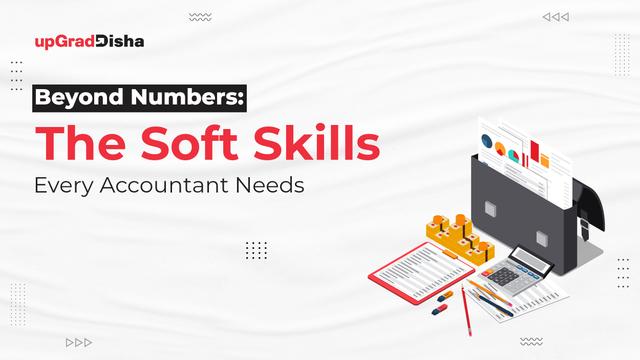Beyond Numbers: The Soft Skills Every Accountant Needs
June 5th, 2024: 5 mins
|
This Article Explores:
|
Ever wondered what sets a great accountant apart from the rest? Is there a secret ingredient behind the realm of numbers that turns financial experts into office maestros? Join us as we unravel the mystery behind exceptional accountancy in this article.
As an increasing number of individuals are gravitating towards the field of finance, did you know that by the end of 2032, the employment rate of accountants is expected to grow by 4%?
Accountancy is often perceived as a number-driven profession, and while technical skills such as financial accounting skills or management accounting skills are important, the role of an accountant extends beyond crunching numbers.
In order to excel as a successful accountant, you need to possess the perfect blend of analytical accounting skills as well as certain soft essential accountancy skills.
In this article, we will explore some key soft skills that every aspiring accountant should actively incorporate into their skillset.
Essential Technical Skills For Accountants
Before moving on to the key soft skills for accountants, let’s first understand what professional accounting skills are.
Technical skills are the backbone of an accountant’s expertise, allowing them to navigate the intricate world of financial data and reporting. Below are some key technical skills that every accountant should possess.
|
Financial Accounting Skills |
It includes proficiency in preparing income statements, balance sheets, and cash flow statements. |
|
Management Accounting Skills |
It refers to the ability to analyze and track costs to aid in the decision-making processes for budgeting and pricing. |
|
Taxation Skills |
Taxation skills in accounting mean staying updated on tax regulations and ensuring accurate and timely tax filings. |
|
Audit and Assurance Skills |
It refers to the ability to examine financial records, ensure compliance, and provide stakeholders with confidence in the accuracy of financial information. |
|
Technology Skills |
Technology skills in accounting denote being well-versed with popular accounting software for efficient data management and reporting. |
Key Soft Skills For Accountants
Mentioned below are some of the most crucial soft skills that every accountant must possess.
-
Communication Skills
Communication is a key skill in every profession, and accounting is no exception to this either. In fact, effective communication is the cornerstone of a successful accounting career.
As an accountant, you often might be required to explain complex financial information to clients, colleagues, and even those without a financial background. Clear and concise communication in this aspect will help to build trust and foster positive relationships. Whether writing reports, giving presentations, or collaborating with team members, strong communication skills are undoubtedly indispensable to an accountant's successful career.
-
Attention To Detail
The importance of attention to detail cannot be overstated in the world of accounting. Minute errors in financial statements or miscalculations can lead to significant consequences. Therefore, cultivating a keen eye for detail is extremely crucial as it helps ensure accuracy in financial reporting, preventing costly mistakes and promoting overall reliability.
-
Analytical Accounting Skills
From scrutinizing financial documents to determining cash flow for a client, as an accountant, you will have to deal with many tasks that involve in-depth analysis. In addition, you might also be required to assess metrics such as sales, margin, and expenses to propose the necessary measures that can attract more profit for your clients.
All these tasks require strong analytical skills that enable you to assess complex situations, identify patterns, and derive meaningful insights. In addition, analytical accounting skills are also essential for making informed financial decisions and providing valuable advice to prospective clients.
-
Time Management Skills
The accounting profession is notorious for tight deadlines and multiple tasks. In order to ensure that you can complete all the responsibilities in an effective and efficient manner, time management skills are necessary. Furthermore, effective time management skills also ensure that all aspects of financial reporting and analysis receive the attention they deserve, thereby contributing to the overall success of an organization.
Apart from these, there are several other essential accountancy skills, including adaptability, teamwork, organizational skills, emotional intelligence, bookkeeping skills, and problem-solving abilities, among others.
Conclusion
While technical skills are vital for accountants, a combination of soft skills is equally essential for a well-rounded and successful career. The ability to communicate effectively, pay attention to detail, think analytically, and manage time efficiently are all building blocks of a thriving accounting profession. By developing these soft skills, you can elevate your careers, contribute meaningfully to organizations, and navigate the complexities of the ever-evolving business landscape.
You can also explore online B.Com programs like B.Com in Accountancy to catalyze your skillset for a dynamic career in finance.
